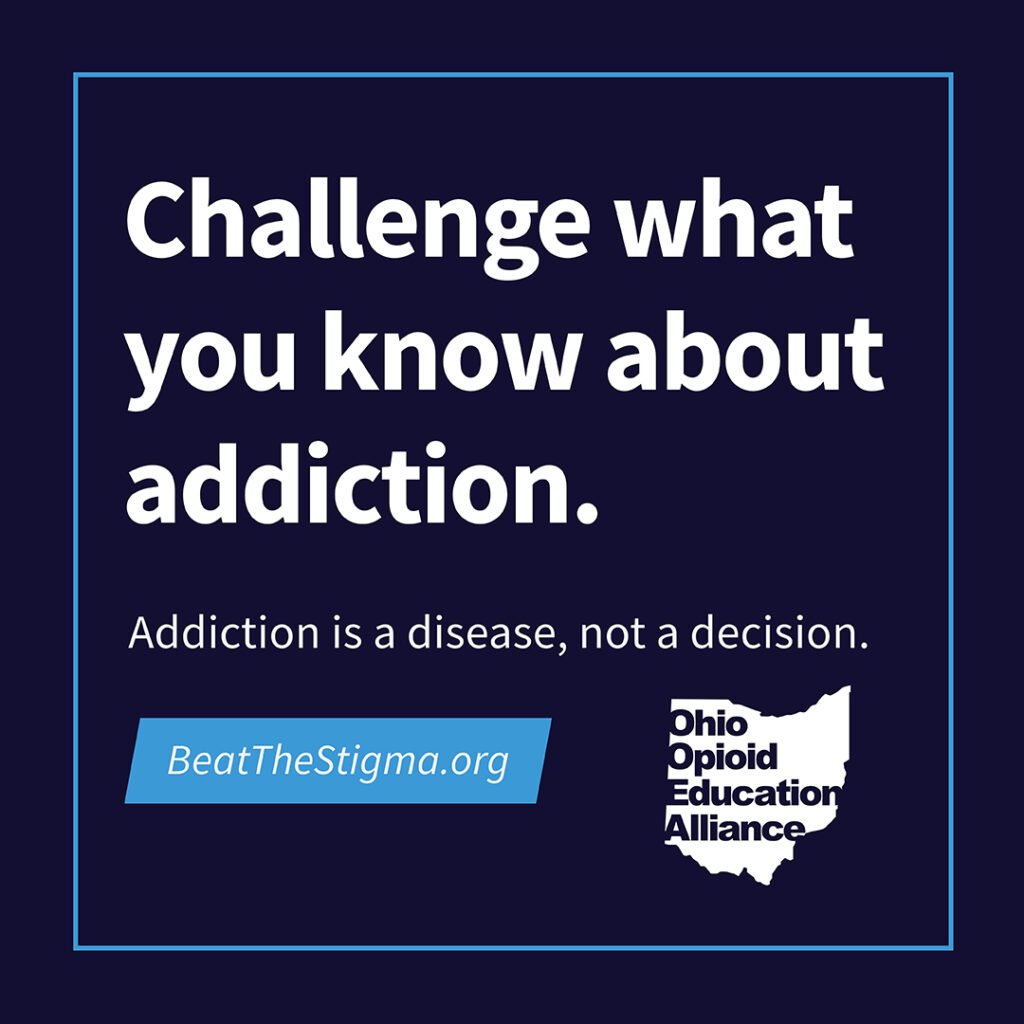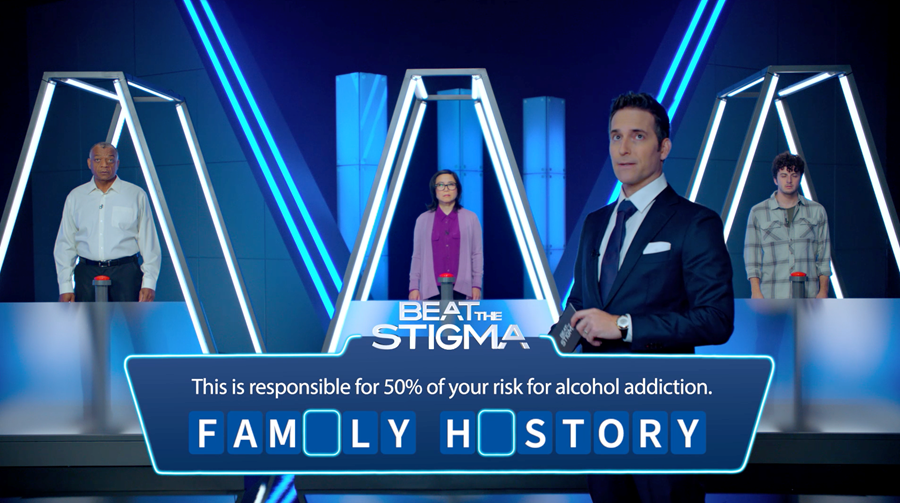
Being a member of the Ohio Opioid Education Alliance means you are making a direct impact on communities across the state of Ohio. Use this content to help promote your membership of the Alliance and encourage others to join — and help beat the stigma.

Statewide Initiative to “Beat the Stigma” Announced
Campaign Urges Ohioans to “Challenge What You Know” About Addiction, Mental Illness
COLUMBUS, Ohio — The stigma surrounding addiction and mental illness isn’t just cruel and misinformed; it prolongs the problem by discouraging people with substance misuse disorder and mental illness from even seeking help.
That’s the basis of a new, statewide initiative announced today by the Ohio Opioid Education Alliance in collaboration with RecoveryOhio. The Alliance is the group of community organizations and businesses that launched the “Denial, OH” campaign in 2018. Just as that campaign urged parents to talk to their children about prescription opioid misuse and to understand that anyone’s child can be at risk, the effort announced today is aimed at helping Ohioans understand that addiction and mental illness are complex diseases — partly the result of genetics and other factors, which are largely out of a person’s control, and not always moral failings or poor character.
While the Denial, OH campaign focused on central Ohio, the anti-stigma messages will run across the state, starting with 30-second TV ads featuring a fictional game show called “Beat the Stigma!”
The Beat the Stigma campaign will encourage Ohioans to do three things:
- Challenge how you think about addiction. When you see someone who lives with addiction, there’s always more to the story than you know. Practice empathy, not judgement.
- Know your risk. If there’s a history of addiction in your family, know that this increases your risk for addiction. Know your risk and talk to your loved ones about what this means so they can make informed choices.
- Take care of your mental health. Mental health challenges can put you at risk for substance misuse.
The campaign will appear on broadcast television, streaming services, radio, outdoor advertising, and digital and social media. It also will engage communities across Ohio through grassroots activities.
The campaign is the result of months of primary and secondary research with input from Ohio’s addiction and mental health experts as well as people with firsthand experience with substance use and mental health disorders.
Messages for Beat the Stigma were developed by Nationwide’s national marketing and advertising agency.
The state of Ohio announced its commitment of $9.75 million to the initiative in February, and today’s announcement kicks off a campaign by the Opioid Alliance to raise matching funds from businesses and community partners in Ohio.
“Substance use disorder and mental health issues aren’t character flaws,” Gov. Mike DeWine said. “They’re diseases for which people deserve treatment and support on a path to long-term recovery. This campaign is meant to tear down any preconceived notions and reduce stigma to encourage people to seek treatment.”
The Alliance is led by the Nationwide Foundation and includes partners across the state. Nationwide Chief Executive Officer Kirt Walker is appealing to Ohio business leaders to contribute to the campaign.
“The stigmas surrounding addiction and mental health are workplace issues as much as they are battles being waged at home or on our streets,” Walker said. “The Denial, OH campaign had a real impact, encouraging parents and guardians to talk to their kids about opioid misuse, and we want to do our part to make the same kind of difference in combatting stigma.”
Greta Mayer, chief executive officer of the Mental Health & Recovery Board of Clark, Greene and Madison Counties, said reducing stigma can be as important as clinical treatment for people with addiction and mental illness. “In our field, we often say, ‘Treatment works. Recovery happens,’ and it’s true,” Mayer said, “but stigma gets in the way of people seeking treatment and reaching recovery.”
Data from a 2019 survey by the federal Substance Abuse and Mental Health Services Administration, combined with Ohio population data, suggests that 1 in 13 Ohioans struggle with addiction. Traumatic experiences such as physical or mental abuse, especially in childhood, increase a person’s risk for addiction. Mental illness also is a risk factor for addiction and the two diseases often overlap.
MEDIA CONTACT:
Lindsey Shapiro
Paul Werth Associates
Email: lshapiro@werthpr.com
Cellphone: 330-717-1699

By now, many of you may have seen a TV commercial or heard a radio ad urging you to “Beat the Stigma” — the first wave of the Ohio Opioid Education Alliance’s new public education campaign, aimed at defeating the harmful stereotyping around addiction and mental illness that can be as damaging to people as the diseases themselves.
The campaign launched on Nov. 10 with Gov. Mike DeWine and leaders of Nationwide, the Nationwide Foundation, and state and county mental health and addiction agencies, unveiling the first TV ad. It features a fictional game show in which all three contestants fail miserably to “Beat the Stigma” — to recognize that the single most important predictor of whether a person will have an addiction is family history, not “making bad choices” or “hanging out with the wrong people.”
The ad is funny, but it lays a foundation for the campaign’s very serious message: Addiction and mental illness are biological diseases, not character flaws. Through paid advertisements, news stories, online sources, social media and more, the campaign will ask Ohioans to do three things:
- Challenge what you know about addiction and mental health. When you see someone who lives with addiction or a mental illness, there’s always more to the story than you know. Practice empathy, not judgment.
- Know your risk. If there’s a history of addiction in your family, know that this increases your risk for addiction. Know your risk and talk to your loved ones about what this means so they can make informed choices.
- Words matter. Supportive words can make a difference. Stigmas are a big reason why people don’t talk about their mental health or seek help. If someone tells you they’re struggling, you can support them by saying “I’m here for you”, “you’re not alone”, and “talking to someone could help.”
Reducing stigma is critical to the fight against addiction and mental illness because it isn’t just cruel to those it affects; it also discourages many from seeking the help they need to get better.
Since our company is a member of the Ohio Opioid Education Alliance, we hope you’ll keep an eye out for the campaign and share it with friends and associates.
